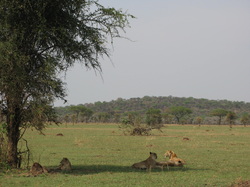2. Conservation versus Development. In Tanzania, it seems like half the NGOs are doing development (including human rights work) and the other half are doing conservation. Often, they are at serious odds. Nick Salafsky wrote a concise paper about the structural failures in attempting to do both conservation and development (e.g. eco-tourism, which usually just becomes yuppy tourism). The early years of conservation attempts in the Serengeti were all relatively enforcement based (catch the poachers!), but it wasn't until recently that NGOs and the Tanzanian National Park Authority began thinking about poverty as an explanation for lack of conservation (who cares about the ecosystem when you struggle to feed your family?). One decent attempt at remedying this is to maintain conservation through development, for example with the creation of Community Conservation Banks as group loans for traditional hunters to diversify their income.
3. Recall bias or straight-up lying. As I begin the process of baseline data collection in the villages, I'm looking right at my sources of bad data. What incentive does a hunter have to report his bush meat collection to a conservation NGO? Why would a submissive Sukuma woman divulge the private details of sexual health to a complete foreigner (mzungu)?
Well, at least there is some evidence of new methods for collecting good bushmeat data. Truthful contraceptive use is TBD.

 RSS Feed
RSS Feed